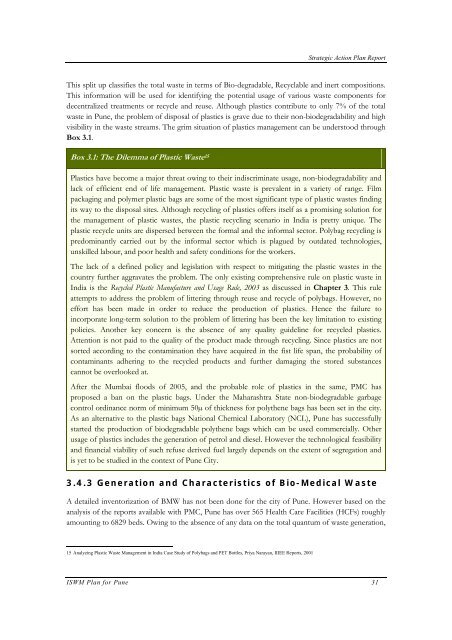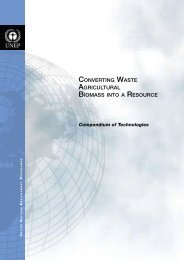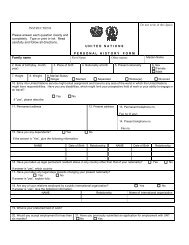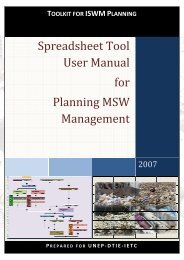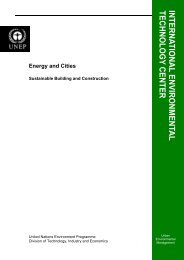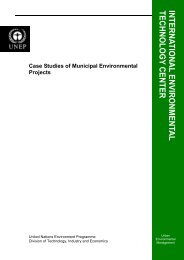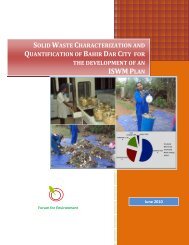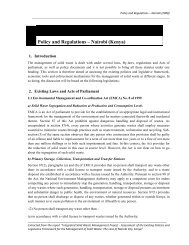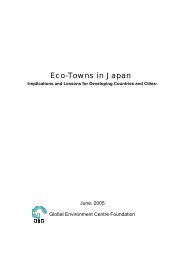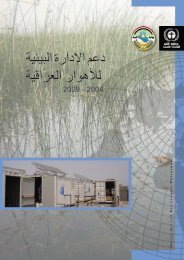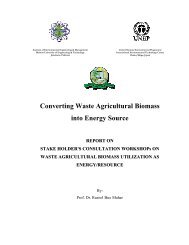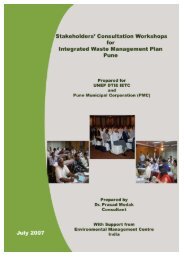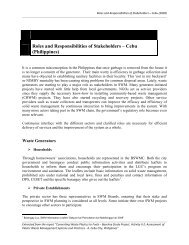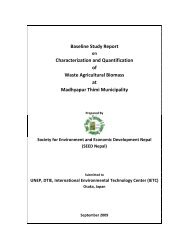Strategic Action Plan - International Environmental Technology Centre
Strategic Action Plan - International Environmental Technology Centre
Strategic Action Plan - International Environmental Technology Centre
You also want an ePaper? Increase the reach of your titles
YUMPU automatically turns print PDFs into web optimized ePapers that Google loves.
<strong>Strategic</strong> <strong>Action</strong> <strong>Plan</strong> Report<br />
This split up classifies the total waste in terms of Bio-degradable, Recyclable and inert compositions.<br />
This information will be used for identifying the potential usage of various waste components for<br />
decentralized treatments or recycle and reuse. Although plastics contribute to only 7% of the total<br />
waste in Pune, the problem of disposal of plastics is grave due to their non-biodegradability and high<br />
visibility in the waste streams. The grim situation of plastics management can be understood through<br />
Box 3.1.<br />
Box 3.1: The Dilemma of Plastic Waste 15<br />
Plastics have become a major threat owing to their indiscriminate usage, non-biodegradability and<br />
lack of efficient end of life management. Plastic waste is prevalent in a variety of range. Film<br />
packaging and polymer plastic bags are some of the most significant type of plastic wastes finding<br />
its way to the disposal sites. Although recycling of plastics offers itself as a promising solution for<br />
the management of plastic wastes, the plastic recycling scenario in India is pretty unique. The<br />
plastic recycle units are dispersed between the formal and the informal sector. Polybag recycling is<br />
predominantly carried out by the informal sector which is plagued by outdated technologies,<br />
unskilled labour, and poor health and safety conditions for the workers.<br />
The lack of a defined policy and legislation with respect to mitigating the plastic wastes in the<br />
country further aggravates the problem. The only existing comprehensive rule on plastic waste in<br />
India is the Recycled Plastic Manufacture and Usage Rule, 2003 as discussed in Chapter 3. This rule<br />
attempts to address the problem of littering through reuse and recycle of polybags. However, no<br />
effort has been made in order to reduce the production of plastics. Hence the failure to<br />
incorporate long-term solution to the problem of littering has been the key limitation to existing<br />
policies. Another key concern is the absence of any quality guideline for recycled plastics.<br />
Attention is not paid to the quality of the product made through recycling. Since plastics are not<br />
sorted according to the contamination they have acquired in the fist life span, the probability of<br />
contaminants adhering to the recycled products and further damaging the stored substances<br />
cannot be overlooked at.<br />
After the Mumbai floods of 2005, and the probable role of plastics in the same, PMC has<br />
proposed a ban on the plastic bags. Under the Maharashtra State non-biodegradable garbage<br />
control ordinance norm of minimum 50µ of thickness for polythene bags has been set in the city.<br />
As an alternative to the plastic bags National Chemical Laboratory (NCL), Pune has successfully<br />
started the production of biodegradable polythene bags which can be used commercially. Other<br />
usage of plastics includes the generation of petrol and diesel. However the technological feasibility<br />
and financial viability of such refuse derived fuel largely depends on the extent of segregation and<br />
is yet to be studied in the context of Pune City.<br />
3.4.3 Generation and Characteristics of Bio-Medical Waste<br />
A detailed inventorization of BMW has not been done for the city of Pune. However based on the<br />
analysis of the reports available with PMC, Pune has over 565 Health Care Facilities (HCFs) roughly<br />
amounting to 6829 beds. Owing to the absence of any data on the total quantum of waste generation,<br />
15 Analyzing Plastic Waste Management in India Case Study of Polybags and PET Bottles, Priya Narayan, IIIEE Reports, 2001<br />
ISWM <strong>Plan</strong> for Pune 31


